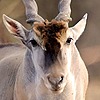HOME | DD
 artbyjrc — Odd armoured assortments - Aspinothoracids
artbyjrc — Odd armoured assortments - Aspinothoracids

#arthrodire #devonian #extinct #fish #placoderm #dinichthys #titanichthys #oxyosteus #bungartius #draconichthys #gymnotrachelus #diplognathus #gnathostome #aspinothoracid #brutonichthys #dunkleosteus
Published: 2023-02-15 09:48:50 +0000 UTC; Views: 22837; Favourites: 358; Downloads: 58
Redirect to original
Description
A selection of arthrodiran placoderms known as aspinothoracids, to scale.
Arthrodires were the most diverse of all placoderms (see Original boxfish - Antiarchs ), dominanting marine environments throughout the Devonian. Traditionally they were split into three major groups - basal Actinolepida, Phlyctaenii and Brachythoraci, however the former two are now considered paraphyletic. Brachythoraci arthrodires are the most familiar due to the familiar Dunkleosteus (see Monster shears - Dunkleosteoids ). It was, however, part of a much larger clade of pelagic swimmers, known as pachyosteomorphs, and included the aspidothoracids.
While there are some distinct families, many species of aspinothoracids are loosely related, including the small durophagus Bruntonichthys, apex predatory Dinichthys, odd-chinned Bungartius and the filter feeding Titanichthys. Dinichthys was once a familiar name in historical palaeontology, usually depicted as a generalistic apex predator terrorising the Devonian seas. Unfortunately a wide variety of large arthrodire remains were lumped under the same name, which included the better known Dunkleosteus. Thus all those original illustrations are actually based on the better known cousin. The little that is known about Dinichthys suggests that it was a slightly smaller predator with an equally powerful bite. Another previous member placed under the Dinichthys name was Titanichthys. Unlike it's close relatives the jaw plates of this giant were small and lacked a cutting blade. Comparisons with living marine species indicate that it was a filter-feeder with a wide gape, the first known example in the fossil record (see A Fishy Tale - Pachycormids , Shark fodder - Cetotheriid whales ). An enigmatic aspinothoracid is Diplognathus, known only from incomplete fragments which reveal it to be a large-eyed piscivore with weak wide-gaping jaws. Other families within the clade include the selenosteids (Draconichthys, Gymnotrachelus) with small to large species, rounded bodies, blunt snouts, slender jaws and large orbits; and the brachydeirids (Oxyosteus) which are characterised by compressed bodies, pointed rostrums, short trunk plates and large orbits.
As with all placoderms, the aspidothoracids died out during the end of the Devonian extinctions.
Related content
Comments: 45

👍: 2 ⏩: 1

👍: 2 ⏩: 1

👍: 2 ⏩: 0

👍: 1 ⏩: 1

👍: 2 ⏩: 3

👍: 2 ⏩: 2

👍: 2 ⏩: 1

👍: 2 ⏩: 1

👍: 2 ⏩: 1

👍: 1 ⏩: 1

👍: 0 ⏩: 0

👍: 2 ⏩: 1

👍: 2 ⏩: 0

👍: 4 ⏩: 1

👍: 1 ⏩: 0

👍: 3 ⏩: 2

👍: 2 ⏩: 0

👍: 3 ⏩: 0

👍: 1 ⏩: 0

👍: 1 ⏩: 1

👍: 1 ⏩: 0

👍: 1 ⏩: 1

👍: 5 ⏩: 1

👍: 2 ⏩: 1

👍: 0 ⏩: 1

👍: 1 ⏩: 0

👍: 3 ⏩: 1

👍: 1 ⏩: 0

👍: 1 ⏩: 1

👍: 0 ⏩: 0

👍: 2 ⏩: 1

👍: 2 ⏩: 0

👍: 1 ⏩: 1

👍: 1 ⏩: 1

👍: 1 ⏩: 2

👍: 3 ⏩: 1

👍: 1 ⏩: 0

👍: 1 ⏩: 0

👍: 3 ⏩: 1

👍: 3 ⏩: 1

👍: 2 ⏩: 0

👍: 3 ⏩: 1

👍: 3 ⏩: 0

















